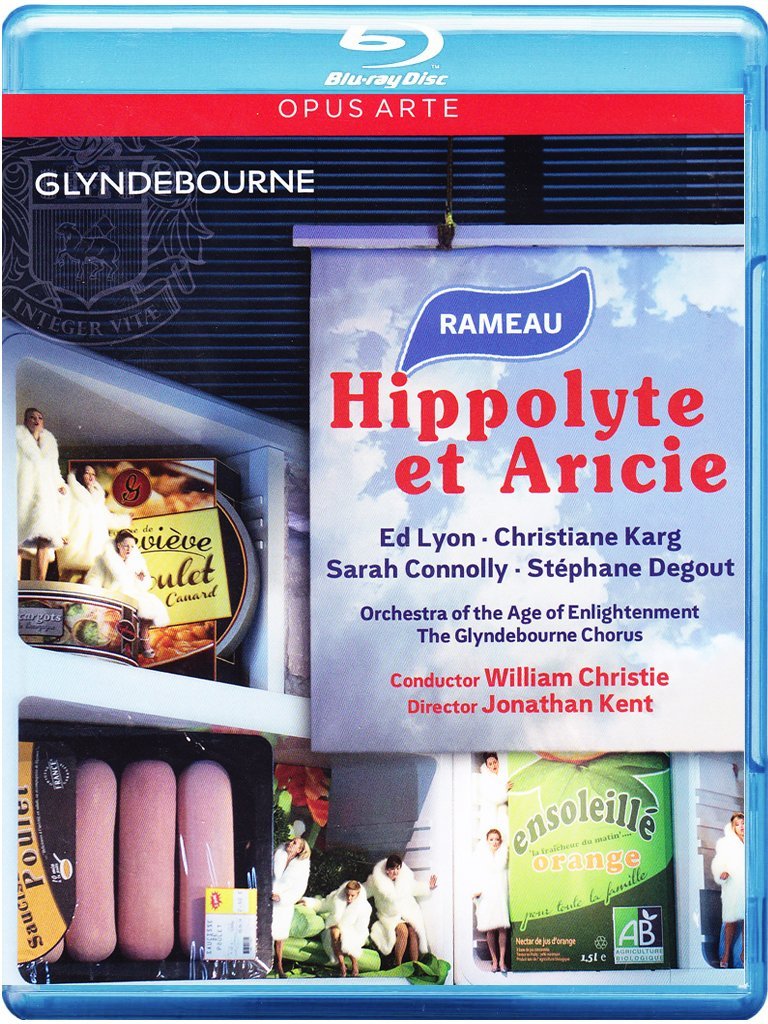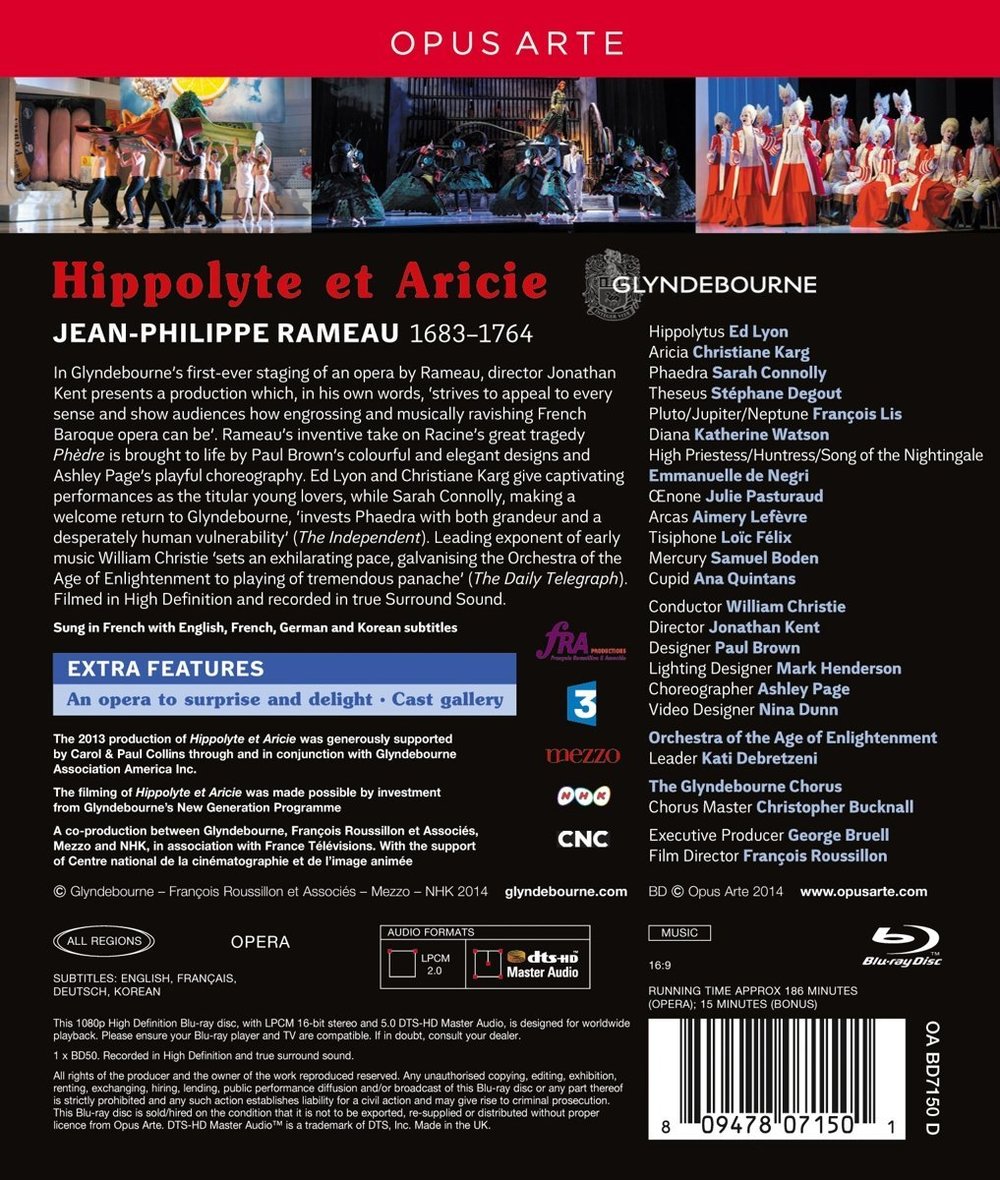

Rameau Hippolyte et Aricie opera to a libretto by Simon-Joseph Pellegrin. Directed 2013 by Jonathan Kent at the Glyndebourne Festival. Stars Ed Lyon (Hippolytus), Christiane Karg (Aricia), Sarah Connolly (Phaedre), Stéphane Degout (Theseus), François Lis (Pluto/Jupiter/Neptune), Katherine Watson (Diana), Emmanuelle de Negri (High Priestess/Huntress/Song of the Nightingale), Mathias Vidal (Follower of Cupid/First Fate), Ana Quintans (Cupid/Sailor Girl), Aimery Lefèvre (Arcas/Second Fate), Julie Pasturaud (Œnone), Samuel Boden (Mercury), Callum Thorpe (Third Fate), Loïc Félix (Tisiphone), Charlotte Beament (Priestress), and Timothy Dickenson (Hunter). Dancers were Sophie Allnatt, Thomas Baylis, Nicole Craddock, Anthony Kurt Gabel, Jarkko Lehmus, Martin Lindinger, Naomi Murray, and Johanna Nuutinen. William Christie conducts the Orchestra of the Age of Enlightenment (Leader Kati Debretzeni) and The Glyndebourne Chorus (Chorus Master Christopher Bucknall). Benoît Hartoin harpsichord continuo; Jonathan Manson cello continuo; Chi-Chi Nwanoku double bass continuo. Designs by Paul Brown; lighting by Mark Henderson; choreography by Ashley Page, and video designed by Nina Dunn. Executive production by George Bruell. Direction for TV by François Roussillon; sound supervision by Jean Chatauret; music production by Sébastien Chonion. Sung in French. Released 2014, disc has 5.1 dts-HD Master Audio sound. Grade: A+
Our friends at Glyndebourne are past masters at popularizing baroque operas and keeping us awake with fantastic but tasteful updating of the mise-en-scène. Here they team up with François Roussillon, arguably the best HD videographer working today, as co-producer. The result is a monster-mash hit of amazing sights and sounds brilliantly recorded for your enjoyment in the home theater.
This is also a very fine ensemble piece with 23 characters sung by 16 perfectly-cast performers, only one of whom (Sarah Connolly) is all that well-known. For novice opera fans like me, the biggest difficultly is the jaw-breaking title—how do you pronounce the names of the obscure mythical lovers? Were I to direct this, I would give it a new name: The Third Wish. Pop quiz: why might The Third Wish be a good name? (If you don't already know, find out by finishing this review.)
The opera opens with a video of the ancient face of Destiny (not credited), more powerful than men or gods. Before the final curtain you will see something rare from Destiny—a tear:
The story, written in French, is about a spat between Diana, the cool goddess of the moon, chastity, and marriage (and also the hunt) and Cupid, the hot god of erotic love. The scenes mostly take place in cold places, and the prologue opens in a French mini-fridge. This is the goriest exercise of product-placement advertising I've ever seen; I'm pretty sure the François Roussillon associates got some free groceries out of this:
All is at peace under Diana's (Katherine Watson) cool control:
Until Cupid (Ana Quintans), shown here as a rooster, hatches right under Diana's nose. Now we are beginning to see some of the beautiful work done by the Glyndebourne costume shop under designer Paul Brown. The main characters tend to wear modern street clothes, but the supporting performers get some of the most elaborate and well-crafted outfits you could imagine:
Diana expects Jupiter to rid her of this nuisance. But Jupiter replies that even in Diana's realm, Cupid gets his way one day a year:
And what better day than today? The people of the realm enjoy a broccoli, grapefruit, and cauliflower orgy. The Glyndebourne chorus is maybe the most versatile in opera. Here dancers are also mixed in giving you the impression that everybody is singing, dancing, and stripping:
And just as well---Diana has more important things on her mind:
Prince Hippolyte (Ed Lyon) is the son of King Theseus (Stéphane Degout), son of Neptune. Pallas is a great enemy of Theseus and his daughter is Aricie (Christiane Karg). Will it surprise you too much to learn that Hippolyte and Aricie, both worshippers of Diana, are in love? This love presents all kind of dangers. Now we are in Diana's temple, a commercial freezer-locker. Our lovers (both chaste) ask Diana for protection:
Diana's High Priestess (Emmanuelle de Negri) and her virgin bodyguards enter the temple. Of course, there's plenty of venison:
The sexually repressed followers of Diana sublimate their desires in blood rituals. This upsets Aricie, who wants real love:
But now we meet more trouble: Queen Phaedra, the wife of Theseus (Sarah Connolly). She is madly in love with Hippolyte, who is the son of Theseus by another woman. This is both taboo and a security matter for King Theseus if he ever found out. Phaedra despairs and confides with her friend Œonoe (Julie Pasturaud):
Then Phaedra learns that Theseus has died. You can read her every thought in her face.
But Theseus hasn't died. It seems Theseus had a close friend, Pirithous, who rashly tried to seduce Persephone, the wife of Pluto, the god of Hell. Pluto caught him and has confined him in a torture chamber. It also seems that Theseus was granted three wishes by his father Neptune. Theseus cashed in Wish 1 to visit Hell, where he hoped to rescue Pirithous. And where is Hell? Well, I bet the nastiest place in your house is right behind your fridge (go ahead, take a look). And that's also where Hell is, as you can see from our next screenshot. Theseus diplomatically approaches Pluto. Surrounding Pluto are the blowflies of Hell, who do some mean dancing welcoming the arrival of their celebrity visitor:
Pluto praises Theseus for his many good deeds on earth, but still offers him no hope:
Now, in one of many fine close-up images in the video, Theseus cashes in Wish 2, to be allowed to go back to the surface:
Neptune sends Mercury riding on a thermometer to be legal counsel to Theseus. There's a lot of clever writing in this libretto. For example, here Mercury has a defense in depth. First he tries to argue the facts:
When that doesn't work, Mercury argues constitutional law and the theory of the three branches of government: The Heavens (Jupiter), the Surface (Neptune), and Hell (Pluto). Surprisingly, Pluto reveals himself to be a statesman:
Theseus is escorted back to the surface by the Three Fates (Mathias Vidal, Aimery Lefèvre, and Callum Thorpe ) who sing a raucous trio to him as they parse and divine messages from the Filament of Fate that one of them extrudes from an organ (like the curmudgeons who used to gather at stock-brokers' offices to spend their days watching the ticker tape):
And here's Hell at home. Phaedra (thinking that Theseus is dead) reveals her lust for Hippolyte and offers him the King's Crown if he will marry her. But our hero is only thinking of Aricie:
Consumed by horror at her own crime, Phaedra tries to commit suicide. Hippolyte is trying to stop her when Theseus suddenly comes in the door. He thinks Hippolyte is trying to rape his wife. Hippolyte is, of course, too polite to blame his step-mother for anything:
Before Theseus can sort things out, the people (seamen all) of the town arrive to celebrate the return of their king:
There is a "vortex" mirror on the wall of the refrigerator palace. In an image that only can be seen in the home theater, Theseus must remain calm while we watch the population in the mirror dancing about joyously. The only way to get images like this is to make the TV director part of the production team from the beginning:
The aquarium reacts in various ways to events in the palace! Theseus decides he must punish Hippolyte with death, and he makes his Wish 3 to Neptune for help. The aquarium bursts into a school of stinging jellyfish, and pipes burst throughout the realm soaking everyone. I think these astonishing effects are created physically, and not with video projections:
The plot gets more complicated as the fates of Hippolyte and Aricie are determined. Diana provides a refuge:
And Cupid provides entertainment:
Phaedra confesses to Theseus of her guilt and kills herself:
Theseus thinks that he has drowned Hippolyte in a storm. Consumed with remorse, he asks Neptune for permission to die. But Neptune reveals that Theseus was saved by Diana. Still, as punishment, Theseus will never see Hippolyte again:
Now we are in the last Act, which takes place in a morgue. Diana saved the lovers and had her triumph over Cupid. Theseus can hear the action, but he's not allowed to see:
There's more to come, including surprises I'll not reveal. Except that in celebration of the marriage, there's a fantastic duet for soprano and flute called the "Song of the Nightingale." Here Emmanuelle de Negri pops open a morgue door to sing as Nightingale:
The screenshots demonstrate the beautiful PQ of the video as well as Roussillon's masterful picture content with a balance of long-range, mid-range, and close-up views of the action. I don't recall any motion artifacts. SQ is also good. I doubt I'll ever be an ardent fan of period-instrument music, but I was impressed by the tremendous variety in Rameau's score and especially with his depiction of the dramatic music of Hell. So what else could I say—this is one of the very best baroque opera HDVDs we have and fully earns an A+.
(PS: In the January 2015 Gramophone (page 90-91), David Vickers discusses a traditional production of Hippolyte et Aricie directed by Ivan Alexandre in 2012 at the Paris Opera (with a cast including 4 of the singers used later in the Glyndebourne show). Olivier Simmonet was the TV director, and his video recently was published in DVD. Vickers reports the DVD video is "lackluster and brownish on screen, which seems at odds with the kaleidoscopic sounds of Rameau's music." Friends, when a print music critic goes to the trouble to say that a video is weak, you can be sure the video is totally rotten. My guess would be that poor Simmonet was brought into the project too late to demand the light he needed and that's why his work wound up coming out as an obsolete DVD. This doesn't happen to François Roussillon. He doesn't touch a project unless he gets, early on, the access, full cooperation, gear, and lighting he needs to do a superb job.)
Well, here's a neat clip:
OR


































